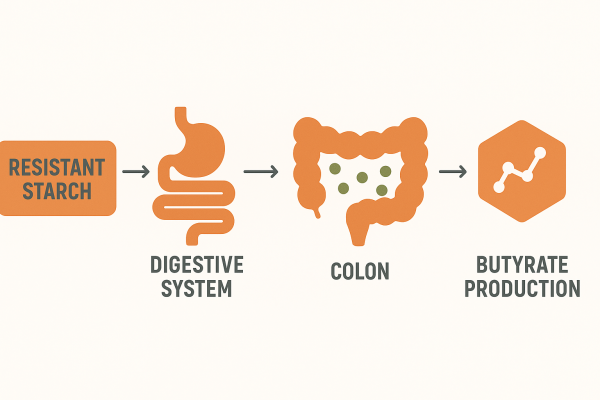

By Dr. Justin Marchegiani
When people hear starch, they immediately think of carb-heavy comfort foods like bread, pasta, or pastries—often linked to blood sugar spikes and weight gain. But not all starches behave the same way in the body.
Resistant starch is a unique form of carbohydrate that “resists” digestion in the small intestine. Instead of breaking down into glucose and raising blood sugar, it passes through undigested until it reaches the large intestine, feeding your beneficial gut bacteria.
Unlike processed carbs, resistant starch:
Does not spike blood sugar
Does not knock you out of ketosis
Acts as a powerful prebiotic to support a healthy microbiome
In fact, research shows resistant starch may help stabilize blood sugar, increase insulin sensitivity, and support gut healing.

There are several natural sources of resistant starch, but two stand out for their ease of use and therapeutic benefits:
Unripened Banana Flour – Made from green bananas, this option is grain-free, gluten-free, and nightshade-free, making it ideal for those with autoimmune conditions.
Cooled Potato Starch – When cooked and cooled, potatoes develop resistant starch. However, potato starch contains alpha-solanine, a compound that may worsen inflammation in those with autoimmune diseases.
Tip: If you have an autoimmune thyroid condition (like Hashimoto’s), try banana or plantain flour first. Some patients tolerate potato starch well—so experiment to see which works best for you.

Resistant starch acts like fertilizer for your microbiome. When gut bacteria ferment resistant starch, they produce butyric acid—a short-chain fatty acid that:
Lowers inflammation
Nourishes colon cells
Helps prevent SIBO (Small Intestinal Bacterial Overgrowth)
Studies show resistant starch can:
Increase insulin sensitivity (helping cells use glucose more efficiently)
Support weight management by increasing satiety
Reduce cravings and stabilize appetite
Butyric acid makes the gut more acidic, which creates an inhospitable environment for harmful bacteria while allowing beneficial bacteria to thrive.
Preliminary research suggests that butyrate may help protect against colorectal cancer by promoting healthy cell turnover and reducing inflammation.
While resistant starch can be a powerful tool, it’s not a stand-alone solution for deeper gut imbalances. Functional medicine testing helps uncover hidden infections, dysbiosis, and inflammatory markers that resistant starch alone can’t fix.
GI-MAP Comprehensive Stool Analysis: This test detects bacterial imbalances, parasites, yeast, and inflammatory markers like calprotectin and secretory IgA.
Organic Acids Test (OAT) – Identifies dysbiosis and evaluates short-chain fatty acid production, including butyrate.
SIBO Breath Test – Measures hydrogen and methane gas levels to confirm bacterial overgrowth in the small intestine.
Why it matters: If resistant starch causes bloating, gas, or abdominal pain, you may have SIBO or dysbiosis that needs targeted treatment before reintroducing prebiotics.
Start low, go slow—especially if you’ve had digestive issues.
Dosage Guidelines:
Begin with one teaspoon daily
Increase gradually every 3–5 days
Work up to 2 tablespoons per day
If symptoms (bloating, gas, pain) occur, reduce by half and increase more slowly
One interesting clinical trick:
If you react strongly to even a small dose of resistant starch—with symptoms like bloating, cramping, or excessive gas—it could indicate SIBO.
While formal testing may be needed, this simple self-test can help guide your next steps toward gut healing.
If you have chronic gut issues such as:
Leaky gut syndrome
Frequent bloating
Chronic fatigue
Low thyroid symptoms
Unexplained weight gain
…you may need a comprehensive gut healing plan, including:
Removing pathogens and overgrowths
Rebalancing beneficial bacteria
Repairing the gut lining with targeted nutrients
Resistant starch can be part of the maintenance phase, but deeper work is often required first.
If you’re experiencing digestive distress, autoimmune flare-ups, or stubborn weight gain, it’s time to address the root cause. Functional medicine testing can reveal the exact imbalances holding you back.
✅ Schedule a free consultation today: www.justinhealth.com/free-consult
Bodinham CL, et al. “Resistant starch improves insulin sensitivity in metabolic syndrome.” Diabet Med. 2010;27(5): 448–455. https://pubmed.ncbi.nlm.nih.gov/20164321
Bird AR, et al. “Resistant starch as a prebiotic and synbiotic: state of the art.” Proc Nutr Soc. 2013;72(2): 171–181. https://doi.org/10.1017/S0029665112000863
Higgins JA. “Resistant starch and energy balance: impact on weight loss and maintenance.” Crit Rev Food Sci Nutr. 2014;54(9):1158–1166. https://pubmed.ncbi.nlm.nih.gov/22517765
====================
IN CASE YOU MISSED IT:
Keto Tips and Common Misconceptions
Overcoming Unexplained Infertility Gut, Immune & Mindset Shifts with Monica Cox Finding Fertility Naturally| Podcast #460